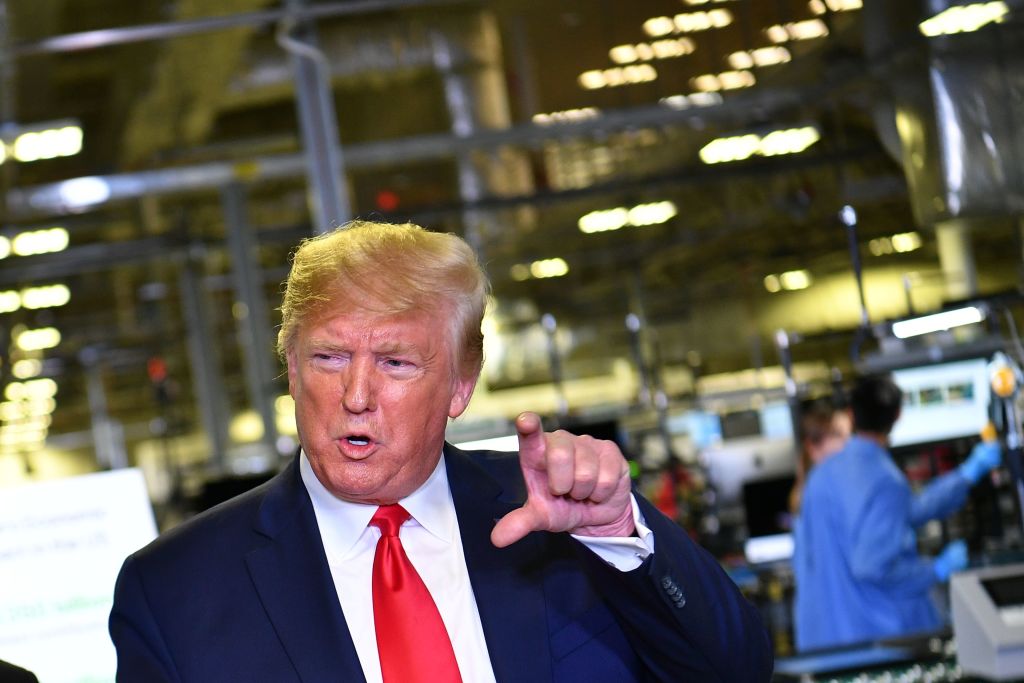Trump's tariffs have backfired, at least so far, Federal Reserve reports


A free daily email with the biggest news stories of the day – and the best features from TheWeek.com
You are now subscribed
Your newsletter sign-up was successful
President Trump has promoted his trade policy, specifically his tariffs on imported goods, as a means of reviving American manufacturing. It has done the opposite, according to a new study from Federal Reserve economists. Trump's trade war with China and other countries has led to higher consumer prices, failed to boost U.S. manufacturing, and led to domestic job losses.
"We find that the 2018 tariffs are associated with relative reductions in manufacturing employment and relative increases in producer prices," write Fed economists Aaron Flaaen and Justin Pierce. The tariffs did boost the competitiveness of some U.S.-made goods inside the U.S., they found, but that was "completely offset in the short-run by reduced competitiveness from retaliation and higher costs in downstream industries," and protectionist policies are now intrinsically "complicated by the presence of globally interconnnected supply chains."
The industries hit especially hard by "tit-for-tat retaliation" from China and other trading partners include automobiles, iron and steel, aluminum sheet, leather goods, appliances, and various appliances and electronic goods. Those hurt by increased prices include aluminum, steel, boilers, and appliances. "While the longer-term effects of the tariffs may differ from those that we estimate here, the results indicate that the tariffs, thus far, have not led to increased activity in the U.S. manufacturing sector," Flaeen and Pierce conclude.
The Week
Escape your echo chamber. Get the facts behind the news, plus analysis from multiple perspectives.

Sign up for The Week's Free Newsletters
From our morning news briefing to a weekly Good News Newsletter, get the best of The Week delivered directly to your inbox.
From our morning news briefing to a weekly Good News Newsletter, get the best of The Week delivered directly to your inbox.
"The researchers don't measure the effects on business confidence resulting from the uncertainty regarding U.S. international trade policy," says Greg Robb at MarketWatch. "Many economists see this doubt about future government policy as a primary driver in the decline in business investment this year." Read The Week's Jeff Spross for other economic policy failures that ended up making the 2010s a lost decade.
A free daily email with the biggest news stories of the day – and the best features from TheWeek.com
Peter has worked as a news and culture writer and editor at The Week since the site's launch in 2008. He covers politics, world affairs, religion and cultural currents. His journalism career began as a copy editor at a financial newswire and has included editorial positions at The New York Times Magazine, Facts on File, and Oregon State University.
-
 The environmental cost of GLP-1s
The environmental cost of GLP-1sThe explainer Producing the drugs is a dirty process
-
 Nuuk becomes ground zero for Greenland’s diplomatic straits
Nuuk becomes ground zero for Greenland’s diplomatic straitsIN THE SPOTLIGHT A flurry of new consular activity in Nuuk shows how important Greenland has become to Europeans’ anxiety about American imperialism
-
 ‘This is something that happens all too often’
‘This is something that happens all too often’Instant Opinion Opinion, comment and editorials of the day
-
 TikTok secures deal to remain in US
TikTok secures deal to remain in USSpeed Read ByteDance will form a US version of the popular video-sharing platform
-
 Unemployment rate ticks up amid fall job losses
Unemployment rate ticks up amid fall job lossesSpeed Read Data released by the Commerce Department indicates ‘one of the weakest American labor markets in years’
-
 US mints final penny after 232-year run
US mints final penny after 232-year runSpeed Read Production of the one-cent coin has ended
-
 Warner Bros. explores sale amid Paramount bids
Warner Bros. explores sale amid Paramount bidsSpeed Read The media giant, home to HBO and DC Studios, has received interest from multiple buying parties
-
 Gold tops $4K per ounce, signaling financial unease
Gold tops $4K per ounce, signaling financial uneaseSpeed Read Investors are worried about President Donald Trump’s trade war
-
 Electronic Arts to go private in record $55B deal
Electronic Arts to go private in record $55B dealspeed read The video game giant is behind ‘The Sims’ and ‘Madden NFL’
-
 New York court tosses Trump's $500M fraud fine
New York court tosses Trump's $500M fraud fineSpeed Read A divided appeals court threw out a hefty penalty against President Trump for fraudulently inflating his wealth
-
 Trump said to seek government stake in Intel
Trump said to seek government stake in IntelSpeed Read The president and Intel CEO Lip-Bu Tan reportedly discussed the proposal at a recent meeting
